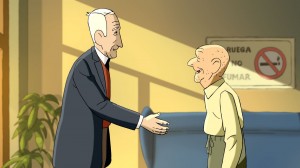
This poignant Spanish comedy animation has good intentions and pleasant touches. It was based on a graphic novel of the same name (2008 Spanish National Comic Prize) by one of its script writers, Paco Roca. The adaptation runs smoothly and the uncluttered 2D goes refreshingly back to basics. The director, Ignacio Ferreras, worked as a character animator on Sylvain Chomet’s Oscar-nominated The Illusionist.
Arrugas (‘Wrinkles’) is set in a nursing home for the elderly. Retired bank manager Emilio (voiced by Alvaro Guevara) is a polite, dignified gent showing early signs of Alzheimer’s. He was living with his son and daughter-in-law when they hurriedly place him in a home.
He befriends his room-mate, gregarious Miguel (Tacho Gonzalez), an unmarried and childless Argentinean who knows the ins and outs of the institution. He gives Emilio the grand tour, providing he is paid for it, and frequently takes advantage of the other confused residents by conning them out of small cash sums.
Miguel, although morally dubious, stays by Emilio’s side as his condition deteriorates. He fixes up his buttons and tie before his medical assessment and writes the answers to the possible questions on his arm, so that the doctor doesn’t ‘send him upstairs’ to the One Flew over the Cuckoos Nest type dwelling for those who have ‘lost their marbles’.
‘Arrugas’ explores the depressing and prominent issue in the developed world: the dilemma facing families of how to care for the elderly in a growing aging population. It is tackled sensitively and from balanced perspectives. One resident cries out: ‘Young people have to live their lives, I don’t want to be a burden’, whereas Miguel rants about the common neglect from such families.
It is difficult to be faced with the ultimate reality of ageing. It can’t be prevented, so what happens when the inevitable arrives? Wrinkles carefully traverses what ordinarily doesn’t bear thinking about. The saddening situations are lifted by Miguel’s no-nonsense approach, such as laughing at the elderly woman who fears that aliens are chasing her, much to Emilio’s dismay.
The comedy gets a tad tiresome due to its play on the stereotypes and clichés of the elderly. They fall asleep often. They can’t hear, see, must take an abundance of pills (Miguel takes Viagra), and so on. In one scene, an instructor with large breasts leads a pass-the-ball game in a gym lesson. One man pretends he can’t hear, so she will lean close and he can grope her. The others fall asleep, don’t understand the instructions or drop the ball. It’s slightly patronizing.
One highlight is the simple aesthetic of the film, and the scenes that allow it to shine. One lady sits in her room all day, smoking invisible cigarettes and gazing out of her window. She thinks she is on the Orient Express. The pale pallor of the anonymous care facility is contrasted with the vibrancy of her imagined world with its stunning views and rich tones.
There are several more scenes like this. When Emilio first arrives his intimidation reminds him of his first day at school. We watch a young Emilio slowly walking into class, muttering that he wants his mum. Dolores (Mabel Rivera), a woman constantly by her sick husband’s side wiping the drool from his mouth, re-visits a romantic story from their childhood which is not dissimilar to the moving scenes in Up.
The subject is a unique stance for an animation and it delicately explores the harsh reality of when those in their advanced years must succumb to mental befuddlement. Yet the comedy and dialogue is often predictable and repetitive. As the film is concerned with having respect for its elderly subjects and stressing that they are people too, it would have been beneficial to lessen the nursing home clichés and focus more on its residents as individuals; their memories, thoughts and imaginings.
3/5
This review was written for Front Row Reviews by Sarah Holland/ The original review can be found here.

No comments:
Post a Comment